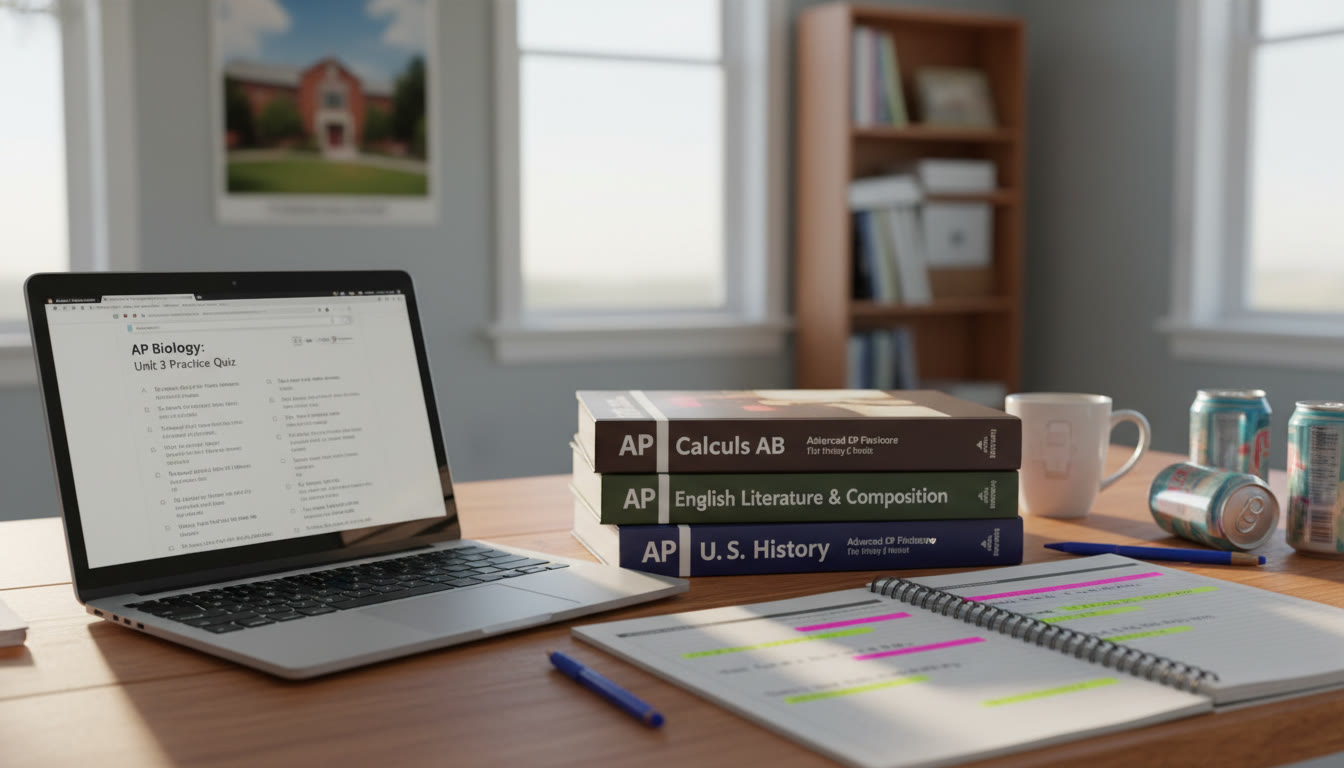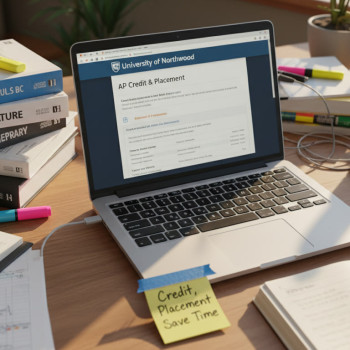Why AP Matters for UConn Applicants — and How to Think About It
If you’re aiming for the University of Connecticut (UConn) and you’re taking AP courses, you’re already giving yourself a head start. AP classes signal to colleges that you’ve challenged yourself with college-level work; AP scores can sometimes translate into college credit or advanced placement; and the knowledge you gain—especially in math, science, and economics—can make your first-year transition smoother. But AP is not just about stacking scores. It’s a strategic tool: used wisely it can shape your coursework, boost your admissions profile, and free up your schedule for internships, research, or a double major.
Who this guide is for
Students (and their parents) who are: considering UConn for Business or Engineering majors, already enrolled in AP courses, or planning a senior year that balances AP exams, college applications, and meaningful extracurriculars. If you’re aiming for competitive majors, this guide will walk you through practical choices—what APs to prioritize, how scores can help, sample course-planning timelines, and concrete study and application strategies.

AP Courses That Matter Most for Business and Engineering
Not all APs are created equal when it comes to Business and Engineering. Choose depth in the right areas rather than a long laundry list of random APs. Here are the high-impact choices:
- AP Calculus AB / BC — Essential for engineering and very helpful for quantitative business pathways. A strong calculus background reduces the need for remedial math and lets you jump into higher-level coursework sooner.
- AP Physics (1, 2, or C) — Physics C (mechanics and/or electricity & magnetism) is especially relevant for engineering students because of its calculus-based approach. Physics 1/2 can still show readiness for STEM.
- AP Computer Science A — Increasingly valuable across engineering and business analytics tracks. It demonstrates coding ability and problem-solving skills.
- AP Statistics — Highly useful for many business majors (marketing analytics, finance) and for some engineering disciplines where data interpretation matters.
- AP Chemistry — Critical for chemical engineering and helpful for other engineering fields to show lab and conceptual strength.
- AP Microeconomics / Macroeconomics — Very relevant if you’re leaning toward business, finance, or economics majors and helps clarify whether business is the right fit.
- AP English Language or Literature — Still important. Solid writing and reading show you can communicate ideas clearly—an underrated but crucial skill in both business and engineering.
How to prioritize APs by year
Your course map should build skills progressively. Here’s a sample approach for a student targeting Engineering or Business at UConn.
- Sophomore year: Start with AP courses that solidify fundamentals—AP World History or AP Human Geography plus AP Biology (if interested in engineering branches that touch life sciences) or AP Statistics.
- Junior year (the heavy-lift year): Aim for AP Calculus AB or BC, AP Physics (or Physics C if offered and you’ve taken calculus concurrently), and AP English. This is the year to aim for your strongest AP scores.
- Senior year: Take AP Microeconomics/Macroeconomics if leaning business, AP Computer Science A if it’s offered, and other depth APs that match your major. Balance rigor with sanity—don’t overload senior year while applying to colleges.
AP Scores, Credit, and Placement—How They Work (And How You Should Use Them)
Many universities accept AP scores for credit and/or placement, but policies vary—sometimes by department. A 4 or 5 generally gives stronger credit/placement possibilities than a 3, but some departments accept 3s for placement only. For UConn-focused planning, it’s smart to understand both the broad logic of AP credit and the particular course sequences for the major you want.
General rules of thumb
- Higher AP scores open up more opportunities for credit and the chance to skip introductory courses.
- Even if you don’t receive credit, AP courses strengthen your transcript and preparedness for rigorous majors.
- Departments sometimes reserve the right to accept or reject AP credit for major prerequisites; always check the departmental policy for your intended major.
Sample table: How AP success translates into academic choices (example format for planning)
| AP Exam | Common Threshold | Typical Result | Student Benefit |
|---|---|---|---|
| Calculus AB/BC | 4–5 (BC) or 4–5 (AB sometimes) | Credit for Calculus I (and II for BC on some campuses) or placement into higher math | Start engineering sequences earlier; avoid introductory math courses |
| Physics C | 4–5 | Placement out of introductory physics courses | Begin advanced mechanics or E&M classes sooner |
| Computer Science A | 4–5 | Possible elective credit or placement into second-level CS | Move into data structures, algorithms earlier |
| Statistics | 3–5 | Credit or placement for intro statistics courses | Useful for business analytics and lab-focused engineering |
Note: This table shows typical outcomes you might expect as you build a plan. Specific credit rules vary. When planning your major roadmap, check the department’s requirements and think about whether free elective credits or placement is more valuable to you.
Crafting an AP-Driven Application to UConn
Admissions are holistic. APs help, but they’re one piece of the story. Use APs to underscore your fit for Business or Engineering and to shape a narrative in your application essays and activities.
Show, don’t just list
Instead of only listing AP classes on your application, show what they enabled. Did AP Calculus prepare you for a robotics project? Did AP Microeconomics spark a small fundraising initiative or an investment club you started? Admissions readers remember the activities that clearly connect to academic preparation.
Balance ambition with authenticity
Taking every AP offered may look impressive, but depth matters more than breadth. For engineering, deep success in calculus, physics, and CS will matter more than a smattering of unrelated APs. For business, combine quantitative APs (Calculus or Statistics) with AP Economics and strong communication (English, History).
Essay angles that APs can support
- Intellectual curiosity: Write about a concept from an AP course that changed how you think or prompted a project.
- Persistence and growth: Share a story of struggling with an AP topic and how you overcame it—this shows grit.
- Application to real problems: Describe how AP knowledge helped you design an experiment, lead a team, or solve a community problem.
Academic Roadmaps: Practical Year-by-Year Plans
Below are two practical sample roadmaps—one for an aspiring UConn engineer, one for an aspiring business major. Use these as templates and adapt them to your school’s offerings and your personal pace.
Sample Roadmap: Aspiring Engineer
- Freshman Year: Focus on strong GPA, Algebra II/Trig or Precalculus. Join STEM clubs or robotics if available.
- Sophomore Year: Take AP Physics 1 (or AP Biology if life sciences track), AP Chemistry if available, begin AP Calculus AB if ready.
- Junior Year: AP Calculus BC (or AB if not), AP Physics C (Mechanics), AP Computer Science A. Prepare for AP exams and SAT/ACT if required.
- Senior Year: AP Physics C E&M (if second part offered), AP Statistics, capstone engineering project or internship. Apply to UConn and request AP score sends.
Sample Roadmap: Aspiring Business Major
- Freshman Year: Strong GPA in core subjects, join business clubs or DECA, start personal finance habits.
- Sophomore Year: AP Microeconomics or AP Human Geography, AP English Language.
- Junior Year: AP Statistics, AP Calculus AB (optional but valuable), AP Microeconomics or Macroeconomics if not taken earlier.
- Senior Year: AP Computer Science A (data skills), AP Macroeconomics, internships, and leadership roles. Apply and send AP scores.
Study Strategies That Actually Move Scores
Good habits beat last-minute cramming every time. Here are study strategies that boost AP performance and build long-term competence.
Focus on practice with purpose
- Practice with real AP-style questions and timed sections. Familiarity with exam format reduces test anxiety and improves pacing.
- Use cumulative review: don’t let early content fade. A weekly quick-review routine for older units helps maintain fluency.
- Target weaknesses. If free-response questions (FRQs) are dragging your score, practice FRQ structure, claim-evidence-reasoning, and clear justifications.
Smart use of resources
Classroom instruction is your anchor—use it well. Supplement with focused resources: AP Classroom videos, well-designed prep books, and targeted tutoring for stubborn topics. For students seeking tailored help, Sparkl’s personalized tutoring can be a powerful complement: one-on-one guidance, tailored study plans, expert tutors who understand how to convert AP knowledge into higher exam performance, and AI-driven insights that track progress and recommend adjustments. When tutoring is integrated into a well-structured study calendar, it becomes an efficiency multiplier.
Practice schedule (example)
- Daily: 20–30 minutes of topic review and practice questions.
- Weekly: One timed practice section plus one FRQ practice or problem set.
- Monthly: Full-length practice exam under test conditions (starting three months out).
Navigating Credit and Major Requirements at UConn (Practical Advice)
When you apply to UConn, think beyond admission—consider how AP credit affects your major roadmap once you matriculate. Some departments welcome AP credit as free electives; others treat them as fulfilling specific prerequisites. Here’s how to make AP credit work for you.
Actions to take before you send scores
- Confirm departmental policies for the major you plan to pursue—especially for engineering sequences and business core classes.
- Decide whether you want credit (which may reduce the total credits needed) or placement (which may let you skip to higher-level courses). Both have pros and cons.
- Request AP score sends thoughtfully—send them to make course registration easier in your first semester if the department uses score reports for placement.
Example scenarios
- If AP Calculus places you into Calculus II, you may be able to start a sequence that leads faster into engineering design courses—this can be a competitive advantage for internships and research in sophomore year.
- If AP Statistics covers a required statistics course for a business analytics track, you’ll have space to take electives in data science or finance—areas that strengthen your job-market readiness.
Beyond AP: Complementary Steps to Strengthen Your Application
APs are powerful, but admissions teams look for a coherent profile. Combine AP success with meaningful experiences to tell a compelling story.
Internships and project work
A short internship or a school-year project that applies your AP knowledge (a small machine learning project after AP CS, a business plan after AP Economics, a robotics build after AP Physics) shows applied learning. UConn and many selective programs value students who bring classroom concepts into real-world contexts.
Competitions and research
Engineering students should consider science fairs, robotics competitions, and research opportunities. Business students benefit from finance competitions, entrepreneurial pitch contests, and DECA. These activities demonstrate initiative and leadership while connecting directly to your chosen major.
Letters of recommendation
Ask teachers who can speak specifically about your academic potential—ideally a STEM teacher for engineering applicants and a math/economics or business teacher for business applicants. If you worked with a tutor or on a capstone project, that supervising teacher or mentor can offer concrete examples of your analytical skills and work ethic.
Planning for the Transition: First-Year Tips Once You’re Admitted
Congratulations—if you’re admitted! Now think strategically about making the most of your first year, especially if AP credit places you out of introductory classes.
Use freed-up credits wisely
Skipping an intro course is a chance to deepen your focus. Consider:
- Taking a higher-level course earlier to stay on an accelerated track for research or co-ops.
- Exploring minors or certificates (data science, entrepreneurship, or language skills can be differentiators).
- Pursuing internships or study abroad in your sophomore year when your schedule may be more flexible.
Meet with your advisor early
Advisors can help map AP credit into degree plans, prevent missteps, and identify optimal sequencing for required courses. Bring your AP score report and a draft of desired major/minor choices to that first meeting.
Common Student Questions — Clear Answers
- Should I take AP exams in every AP course I take? Generally, yes—if you feel prepared. Even if you don’t aim for credit, the exam validates your learning and strengthens your transcript. But balance is key: don’t take exams in courses where you’re unlikely to reach the score you need and that might harm your confidence.
- Is a 3 on an AP worth it? Sometimes. For some institutions and certain courses, a 3 grants placement (not credit) or partial credit. A 4–5 is more useful when seeking credits that change course sequencing.
- How can tutoring help? Personalized tutoring, like Sparkl’s 1-on-1 sessions, offers targeted remediation, practice with past AP question types, and tailored study plans that focus on your weakest exam components. That personalized approach often produces faster, more sustainable score improvements than generic test prep.
- Do APs guarantee admission to competitive majors? No—APs strengthen your academic profile but they do not guarantee admission. Admissions committees evaluate transcripts, essays, recommendations, activities, and fit. Use APs to create a consistent, believable story about your interests and capacity for college-level work.
Final Checklist: Action Items for Students and Parents
Use this checklist to keep your AP journey focused and aligned with your UConn Business or Engineering goals.
- Map the AP courses you’ll take through senior year with an emphasis on calculus, physics, computer science, statistics, and economics as relevant.
- Plan a study schedule that includes daily review, weekly timed practice, and monthly full-length exams starting three months before AP tests.
- Request and verify AP score sends around application season and before course registration if placement is needed.
- Ask departmental advisors at UConn about specific AP policies for your intended major to understand credit vs. placement implications.
- Complement AP courses with at least one applied experience: internship, capstone project, research, or competition.
- Consider targeted, personalized help—Sparkl’s tailored tutoring and study plans can fill gaps, refine test strategies, and build confidence in the months leading up to exams.
Parting Thought: Make APs Work for Your Story
AP classes and exams are tools—powerful ones—but their real value is how you use them. Think of APs as a way to show curiosity, readiness, and direction. For students aiming for UConn’s Business or Engineering paths, APs can open doors, provide academic flexibility, and let you step into substantive classes earlier. Combine strong AP performance with purposeful extracurriculars, applied projects, and coherent essays, and you’ll present an application that’s both believable and compelling.
There’s no single formula for success, but planning matters. Start early, prioritize depth, practice intentionally, and seek focused help when you need it. With thoughtful preparation—whether that means extra practice on FRQs, a consistent weekly review plan, or one-on-one tutoring—your AP journey can be both a rewarding learning experience and a strategic advantage on the path to UConn.

Good luck—and remember: thoughtful preparation beats panic. If you’d like, I can help you build a personalized AP study calendar or a sample first-year course plan tailored to your intended major at UConn.

















No Comments
Leave a comment Cancel